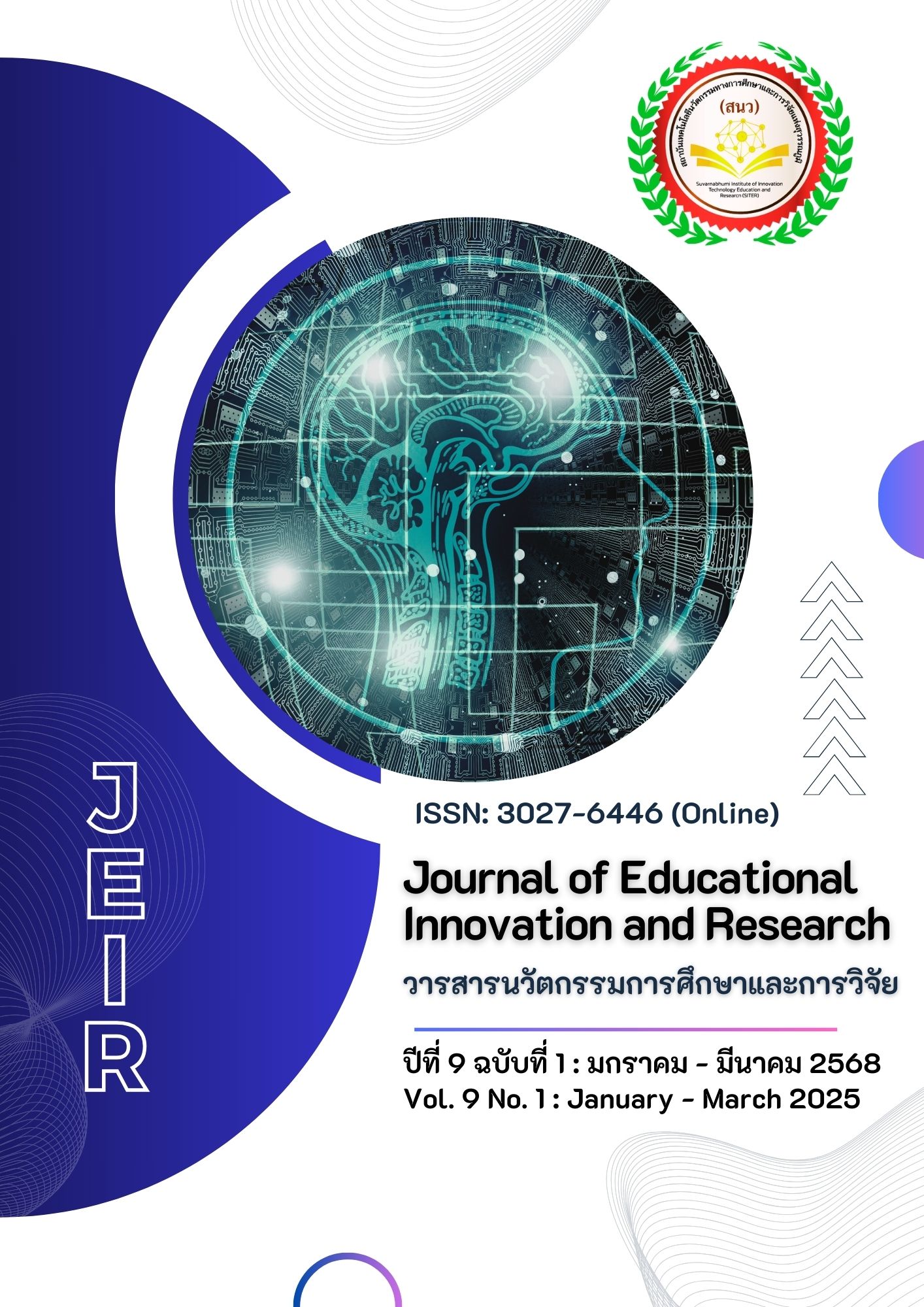การพัฒนานักศึกษาครูด้วยการบูรณาการแนวคิดจิตปัญญาศึกษา การเป็นพี่เลี้ยง และการวิจัยเป็นฐาน คณะครุศาสตร์ มหาวิทยาลัยราชภัฏกาญจนบุรี
Main Article Content
บทคัดย่อ
การพัฒนานักศึกษาครูเป็นภาระกิจสำคัญของสถาบันการผลิตครูเพื่อออกไปรับใช้สังคมและการพัฒนาประเทศชาติ บทบาทสำคัญของการผลิครูต้องช่วยให้เกิดความรู้ ทักษะ ความสามารถและคุณลักษณะของความเป็นครู ซึ่งในปัจจุบันได้มีการพัฒนาครูอย่างหลากหลายและพบปัญหาในการปฏิบัติงานของครูต่อการพัฒนาการเรียนรู้ของผู้เรียน จึงทำให้ต้องพัฒนากระบวนการพัฒนานักศึกษาครูด้วยการบูรณาการแนวคิดจิตปัญญาศึกษา การเป็นพี่เลี้ยงและการวิจัยเป็นฐาน การวิจัยครั้งนี้มีวัตถุประสงค์เพื่อ 1) พัฒนากระบวนการพัฒนานักศึกษาครู 2) ศึกษาผลการพัฒนาครู และ 3) ถอดบทเรียนการพัฒนาครูด้วยการบูรณาการแนวคิดจิตปัญญาศึกษา การเป็นพี่เลี้ยงและการวิจัยเป็นฐาน กลุ่มเป้าหมายได้แก่ อาจารย์พี่เลี้ยงนิเทศ จำนวน 11 คน นักศึกษาครูชั้นปีที่ 5 สาขาวิชาวิทยาศาสตร์จำนวน 10 คน สาขาสังคมศึกษาจำนวน 5 คน รวมจำนวน 15 คน เครื่องมือได้แก่ คู่มือการพัฒนานักศึกษาครูฯ แบบทดสอบความรู้ความเข้าใจครูพี่เลี้ยงและนักศึกษาครู แบบประเมินความสามารถในการจัดการเรียนรู้ แบบประเมินความสามารถการวิจัยในชั้นเรียน และแบบประเมินคุณลักษณะความเป็นครูของนักศึกษา สถิติที่ใช้ในการวิจัยได้แก่ ร้อยละ ค่าเฉลี่ย ส่วนเบี่ยงเบนมาตรฐาน
ผลการวิจัยพบว่า
1. กระบวนการพัฒนานักศึกษาครูด้วยแนวคิด CCR ประกอบด้วย 5 ขั้นตอนดังนี้ ขั้นตอนที่ 1 ร่วมทบทวนความเข้าใจเป้าหมายการพัฒนา ขั้นตอนที่ 2 เตรียมความพร้อมการพัฒนาวิชาชีพ ขั้นตอนที่ 3 นำไปสู่การปฏิบัติงานในวิชาชีพ ขั้นตอนที่ 4 ร่วมประสานติดตามผล การปฏิบัติงาน ขั้นตอนที่ 5 สะท้อนและสรุปบทเรียน
2. ผลการใช้กระบวนการพัฒนานักศึกษาครู ได้ผลดังนี้ 2.1) ความรู้ความเข้าใจของครูพี่เลี้ยง มีค่าคะแนนเฉลี่ย 19.26 คิดเป็นร้อยละ 64.20 ส่วนนักศึกษาครู มีค่าคะแนนเฉลี่ย 18.05 คิดเป็นร้อยละ 60.66 2.2) ความสามารถในการจัดการเรียนรู้โดยภาพรวมอยู่ในระดับมาก 2.3) ความสามารถการวิจัยในชั้นเรียนของนักศึกษาครูภาพรวมอยู่ในระดับปานกลาง และ 2.4) คุณลักษณะความเป็นครูของนักศึกษาครูโดยภาพรวมมีคะแนนเฉลี่ยอยู่ในระดับมาก
3. ผลการถอดบทเรียนกระบวนการพัฒนานักศึกษาครูตามแนวคิด (CCR) มีประเด็นเกี่ยวกับการพัฒนาตามกลไกความร่วมมือร่วมใจ การส่งเสริมการบริหารจัดการ การออกแบบกิจกรรมสร้างความเป็นครู และเงื่อนไขสำคัญผู้ปฏิบัติหากไม่ศึกษาอย่างลุ่มลึกจะไม่สามารถลงสู่การปฏิบัติให้เกิดผลสำเร็จได้
Article Details

อนุญาตภายใต้เงื่อนไข Creative Commons Attribution-NonCommercial-NoDerivatives 4.0 International License.
เอกสารอ้างอิง
Anawachkul, J. (2013). National educational research direction framework. (2012-2015) to support the implementation of government policy, Educational Research Journal Office of the Secretariat of the Education Council. Year 1 (Issue 1, October-December 2013).
Chaisiriwat, S. (2007). The role of administrators in the development of teachers in private primary schools. Independent Study Master of Education Degree Field of Study: Educational Administration Department of Educational Administration Graduate School Silpakorn University.
Chaowatanakul, K. (2010). Development of a mentoring and guidance model to promote teaching and research competencies in the classroom of teaching professional training students. Department of Mathematics, Public Health. Doctor of Philosophy Faculty of Education Silpakorn University.
Costa, A.L. and Garmston, R.J., (2002). Cognitive coaching: A foundation for renaissance schools. Second Edition. Christopher-Gordon Publishers, Inc.
Glickman, Carl. D. and Stephen P. Gordon and Jovita M. Ross-Gordon. (2010). Supervision and Instruction Leadership: A Developmental Approach. 8th ed. Allyn and Bacon.
Gottesman, B. (2000). Evaluating professional development. Corwin Press.
Johnson, D. W., & Johnson, R. T. (1999). Making cooperative learning work. Theory into practice, 38(2), 67-73.
Kanchanawasiม S. (2002). Evaluation theory. 3rd printing. Chulalongkorn University Press.
Knight, J. (2004). Instructional coaches make progress through partnership. Journal of Staff Development, 25 (2), 32-37.
Moon, J. A. (2004). A handbook of reflective and experiential learning: theory and practice. RoutledFalmer.
Office for Educational Standards and Quality Assessment (Public Organization). (2010). Glossary of terms for evaluating educational quality. Office for Educational Standards and Quality Assessment (Public organization).
Office of the Secretariat of the Education Council. (2009). Proposals for educational reform in the second decade (2009-2018). Office of the Secretary of Education.
Office of the Secretariat of the Education Council. (2009). Summary of the results of 9 years of educational reform (1999-2008). V.T.C. Communication.
Phanich W. (2005). Knowledge management. Practitioner edition. Institute for the Promotion of Knowledge Management for Society.
Wiwathamongkol K. (2017). Teacher development model using the professional learning community process. To promote the ability to manage learning according to STEM education at the basic education level. Viridian E-Journal, Silpakorn University, 11(3), 92-114.
Wiwathamongkol, K. (2017). Curriculum development and basic education management. Faculty of Education, Kanchanaburi Rajabhat University.


